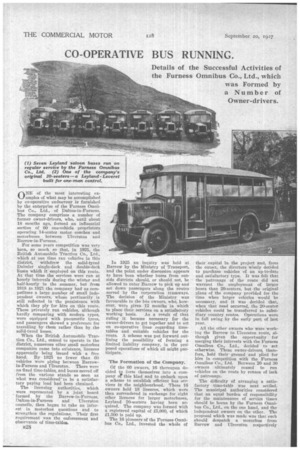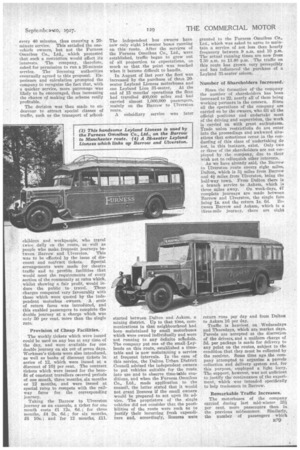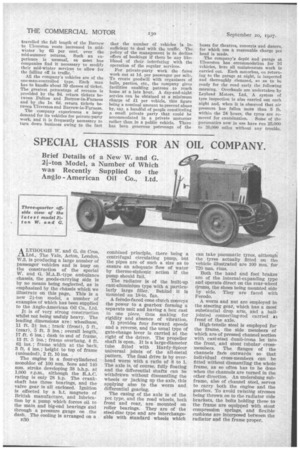CO-OPERATIVE BUS RUNNING.
Page 46

Page 47

Page 48

If you've noticed an error in this article please click here to report it so we can fix it.
Details of the Successful Activities of the Furness Omnibus Co., Ltd., which was Formed by a Numb er of Owner-drivers.
ONE. of the most interesting examples of what may he accomplished by co-operative endeavour is furnished by the enterprise of the Furness Omnibus Co., Ltd., of Dalton-in-Furness. The company comprises a number of former owner-drivers, who, until about 18 months ago, formed an influential section of 60 one-vehicle proprietors operating 14-seater motor coaches and motorbuses between Ulverslou and Barrow-in-Furness.
For some years competition was very keen, so much so that, in 1921, the British Automobile Traction Co., Ltd., which at one time ran vehicles in this district, withdrew the solid-tyred Daimler single-deck and double-deck fuses which it employed on this route. At that time the services were run at hourly intervals during the winter and half-hourly in the summer, but from 1918 to 1921 the company had as competitors a large number of small independent owners, whose pertinacity is still reflected in the persistence with which they ply for hire on this route. These privately run vehicles, although hardly comparing with modern types, were equipped with pneumatic tyres, and passengers showed a preference for travelling by them rather than by the solid-tyred buses.
When the British Automobile Traction Co., Ltd., ceased to operate in the district, numerous other small motorbus companies came into existence, licences apparently being issued with a free hand. By 1925 no fewer than 60 vehicles were plying between Barrowin-Furness and Ulverston. There were no fixed time-tables, and buses moved off from the various stands so soon as what was considered ' to be a satisfactory paying load had been obtained.
The licensing authorities, which were represented by a joint board formed by the Barrow-in-Furness, Dalton-in-Furness and Ulverston councils, then began to take an interest in motorbus questions and to strengthen the regulations. Their first requirement was the enforcement and observance of time-tables.
B28
In 1925 an inquiry was held at Barrow by the Ministry of Transport, and the point under discussion appears to have been whether buses from outside districts should, or should not, be allowed to enter Barrow to pick up and set down passengers along the routes served by the corporation tramways. The decision of the Ministry was favourable to the bus owners, who, however, were given 12 months in which to place their services on a satisfactory
working basis. As a result of that ruling it became necessary for the owner-drivers to get together and to act on co-operative lines regarding timetables and suitable vehicles for the route. A scheme was put forward outlining the possibility of forming a limited liability company, in the proposed operations of which all might participate.
The Formation of the Company.
Of the 60 owners, 16 thereupon decided to form themselves into a company or this kind and to embark upon a scheme to establish efficient bus services in the neighbourhood. These 16 owners held 18 licences, which were then surrendered in exchange for eight other licences for larger motorbuses, Leyland 20-seaters having been acquired. The company was formed with a registered capital of £5,000, of which £1,500 is paid up.
The 16 pioneers of the Furness Omnibus Co., Ltd., invested the whole of their capital in the project and, from the outset, the directors wisely decided to purchase vehicles of an up-to-date and satisfactory type. It was felt that the patronage of the route did not warrant the employment of larger buses than 20-seaters, but the original plans of the company provided for the time when larger vehicles would be necessary, and it was decided that, when that need occurred, the 20-seater vehicles could be transferred to subsidiary country routes. Operations were in full swing by the early part of last year.
All the other owners who were working the Barrow to Ulverston route, although given the opportunity for merging their interests with the Furness Omnibus Co., Ltd., decided to act otherwise. These owner-drivers, therefore, held their • ground and plied for hire in competition with the Furness Omnibus Co., Ltd. Between 20 and 30 owners ultimately ceased to run vehicles on the route by reason of lack of patronage.
The difficulty of arranging a satisfactory time-table was next settled. The municipal authorities considered that an equal burden of responsibility for the maintenance of service times should be borne by the Furness Omnibus Co., Ltd., on the one hand, and the independent owners on the other. The proposal which was made was that each should despatch a motorbus from Barrow and Ulverston respectively every 40 minutes, thus ensuring a 20minute service. This satisfied the onevehicle owners, but not the Furness Omnibus Co., Ltd., which protested that such a restriction would affect its interests. The company, therefore, asked for permission to run a 20-minute service. The licensing authorities eventually agreed to this proposal. Experience and calculation prompted the company to recognize the fact that, with a quicker service, more patronage was likely to be encouraged, thus increasing the chance of making the scheme really profitable.
The decision was then made to endeavour to attract special classes of traffic, such as the transport of school
children and workpeople, who travel twice daily on the route, as well as people who make frequent journeys between Barrow and Ulverston.This was to be effected by the issue of dis
count and contract tickets. Special arrangements were made for theatre traffic and to protide facilities that would meet the requirements of every section of the community at rates which, whilst showing a fair profit, would induce the public to travel. These charges compared very favourably with those which were quoted by the independent motorbus owners. A scale of return fares was introduced, and this enabled passengers to complete the double journey at a charge which was only 50 per cent, more than the single rate.
Provision of Cheap Facilities.
The weekly tickets which were issued could be used on any bus at any time of the day, and were available for one double journey on six out of seven days. Workmen's tickets were also introduced, as well as books of discount tickets in series of 12, which were issued at a discount of 16f per cent. The contract tickets which were issued for the benefit of constant travellers covered periods of one month, three months, six months or 12 months, and were issued at special rate to compete with the railway fares for the corresponding journey.
Taking the Barrow to Ulverston journey as an example, a ticket for one month costs /1 12s. 6d.; for three months, /4 28. 6d.; for six months, £6 10s.; and for 12 months, fit
The independent bus owners have now only eight 14-seater buses running on this route. After the services of the Furness Omnibus Co., Ltd., were established, traffic began to grow out of all proportion to expectations, CO much so that the point was reached when it became difficult to handle.
In August of last year the fleet was increased by the purchase of three 20seater Leyland Lioness motorbuses and one Leyland Lion 31-seater. At the end of 15 months' operations the fleet had travelled 400,000 miles and had carried almost 1,000,000 passengers, ' mainly on the Barrow to Ulverston route.
A subsidiary service was later
started between Dalton and Askam, mining district. Up to that time, communications in that neighbourhood had been maintained by small motorbuses which were owned individually and were not running to any definite scnedule. The company put one of the small-Leylands on this route, established a timetable and is now maintaining a service at frequent intervals. In the case of this service, the Dalton Urban District Council advised the independent owners to put vehicles suitable for the route into use and to observe time-table conditions, and when the Furness Omnibus Co.,. Ltd., made application to the council, the latter stated that it would not grant licences if the small owners would be prepared to act upon its advice. The proprietors of the single vehicles did not consider that the possibilities of the route were such as to justify their incurring fresh expenditure and, accordingly, licences were granted to the Furness Omnibus CO., Ltd., which was asked to agree to maintain a service of not less than hourly frequency between 9 a.m. and 10 p.m. The actual running times are now from 7.30 a.m. to 11.40 p.m. . The traffic on this route has grown very perceptibly
• and has influenced the purchase of a , Leyland 31-seater saloon.
Number of Shareholders Increased., Since the formation of—the company the number of shareholders has been increased to 22, nearly alt of them being working partners in the concern. Since all the operations of the company are carried on by the owners, who fill all the official positions and undertake most of the driving and supervision, the work is carried on with great enthusiasm. Trade union restrictions do not enter into the proceedings and awkward situations that sometimes occur in the conducting of this class of undertaking do not, in this instance, exist. Only two or three of the shareholders are not employed by the company, due to their wish not to relinquish other interests.
As we have already said, the Barrow to Ulverston route covers eight miles, Dalton, which is 31 miles from Barrow and 4i miles from Ulverston, being the half-way town. From Dalton there is a branch service to Ask-am, which is three miles away. On week-days, 47 complete journeys are made between Barrow and Ulverston, the single fare being 1.s. and the return 1s. 6d. Between Barrow and Askam, which is a three-mile journey, there are eight
return runs per day and from Dalton to Askam 16 per day.
Traffic is heaviest on Wednesdays and Thursdays, which are market days. Parcels are accepted at the discretion of the drivers, and a uniform charge of 3d. per package is made for delivery to any point on the routes, subject to the condition that they must be collected by the receiver. Some time ago the company attempted to organize a parcels collection and delivery system and, for this purpose, employed a light lorry. The support, however, was not sufficient to justify the continuance of the experiment, which was intended specifically to heap tradesmen in Barrow.
Remarkable Traffic Increases. The motorbuses of the company carried during last mid-winter 331, per cent, more passengers than in the previous midsummer. Similarly, the number of passengers which 1129 travelled the full length of the Barrow to Ulverston route increased in midwinter by 63 per cent, over the mid-summer returns. Such an experience is unusual, as most bus companies find it necessary to modify their mid-winter services to allow for the falling off in traffic. '
All the company's vehicles are of the one-man-controlled type. Each man has to handle about 30 classes of ticket. The greatest percentage of revenue is provided by the 9d. return tickets between Dalton and Barrow-in-Furness and by the 1s. 6d. return tickets between Ulverston and Barrow-in-Furness.
The company experiences a large demand for its vehicles for private-party work, and it is frequently necessary to turn down business owing to the fact that the number of vehicles is insufficient to deal with the traffic. The policy of the management is to decline offers of bookings if there be any likelihood of their interfering with the operation of the regular services.
For private-party work the fares work out at id. per passenger per mil. To create goodwill with organizers of balls, parties, etc., the company gives facilities enabling patrons to reach home at a late hour. A day-and-night service can be obtained at a minimum charge of £1 per vehicle, this figure being a nominal amount to prevent abuso by, say, a handful of people constituting a small private party that could he accommodated in a private motorcar rather than in a public vehicle. There has been generous patronage of the
buses for theatres, concerts and dances, for which use a reasonable charge per head is made.
The company's depot and garage at Ulverston has accommodation for 16 vehicles, here all maintenance work is carried out. Each motorbus, on returning to the garage at night, is inspected and thoroughly cleansed, so as to be ready for the road early the following morning. Overhauls are undertaken by Leyland Motors, Ltd, A system of tyre inspection is also carried out each night and, when it is observed that air pressure has fallen more than 5 lb. within the 24 hours, the tyres are removed for examination. Some of the pneumatics now in use have run 25,000 to 30,000 miles without any trouble.




































































































